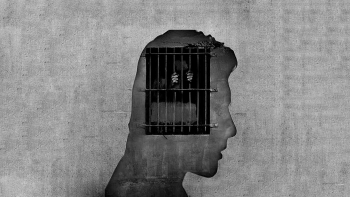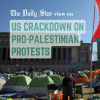Decolonising academia beyond the metaphor

As we continue to witness a genocide unfold in real time through social media, there is no denying that our world has irrevocably changed. Over the last six months, the courage of the Palestinian people has radically shifted the collective consciousness of people in every corner of the world, leading to a global awakening. In many ways, it has exposed the long-standing colonial agenda and hypocrisy of the West, both of which have been slowly crumbling down for quite some time now. Simultaneously, it has sparked necessary conversations regarding military occupation, settler colonialism, neocolonialism, and the deeply interconnected nature of these struggles worldwide. Every day, citizens from all walks of life have been confronting and mobilising against oppressive power structures head-on, in small and large ways.
One such example was the student-led protest at Columbia University in New York, US last week. Several students took to the university campus and set up tents on the lawn, demanding that their institution immediately divest from corporations, institutions, weapons manufacturers, and donors complicit in the genocide against Palestinians. These students remained steadfast as they resoundingly rejected Columbia's shameful stance supporting Israel's brutal occupation. Predictably, what followed was a mass arrest called by the university's administration. The New York Police Department (NYPD) forcibly removed the peaceful student activists from the premises. Many students were also suspended from Columbia and its associate institution, Barnard College, as well as from their housing. This is the same Columbia University that has been home to revolutionary scholars such as Edward Said, Gayatri Spivak, and many more. This, I believe, is not the legacy that Columbia would have hoped to be a part of.
Real decolonisation is difficult work, and it does not only happen through intellectual discourse that garner acknowledgments. It happens through radically enacting its material imperatives for concrete transformations. It happens by disrupting existing power structures that, for centuries, have enabled Western empires, corporations, and elites to destroy, exploit, pollute, and profit at the expense of colonised people.
Just a week prior to the university's crackdown on students, Columbia Journalism School—which houses the Pulitzer Prize—hosted the Palestinian journalist from Gaza, Motaz Azaiza, who played a key role in showing the world the reality of what unfolded after October 7. Columbia shifted its classes online on Monday, April 22, while the faculty staged a walk-out to protest the arrests of students.
Of course, Columbia is not the only university where students have risen up against their university's role in funding the colonial occupation of Palestine. Students in several universities around the world have spoken out against their institutions, all of whom have met a similar fate of repression as the Columbian students. On Monday, police arrested more than 45 protesters at Yale University. After nightfall on the same day, the NYPD arrested students from New York University.
For most of these acclaimed universities, any dialogue or action by students on Palestine that reveals the reality of Israeli settler colonialism and genocide, and protests the institutions' own complicity in it, is deemed as a threat. And in fact, they're right. It is a threat, but not in the way that the administrations have described it. Rather, such dialogue or action is a threat to maintaining the colonial structures of the universities. A united student front that dares to shake up structures of settler colonialism, occupation, and war is indeed the most terrifying possibility to institutions that intend to carry on with the status quo. The courage of these students who stand as voices of moral reasoning is admirable amid this wasteland of perverse immorality and violence within which we find ourselves.
But I believe that this series of ongoing events speaks to a larger crisis that has been looming in academia for decades. Our primary responsibility as academics is to nurture young minds to think critically about the world in order to build a more equitable, inclusive, and democratic society. Academic institutions and their knowledge production are supposed to be guided by an active concern for social change, and by a strong desire to have a meaningful impact on the wider communities in which their works are situated. Unfortunately, when you examine the situation in universities across the West, this is not the case. Instead, students with moral clarity simply speaking their conscience are repressed for challenging the status quo. Consequently, there continues to remain a profound barrier between academic scholarship and meaningful practical action.
This kind of cowardly deference does not come fully as a surprise, though. The development of Western universities has always been deeply implicated in colonialism. From the reliance on Western knowledge production for the inferiorisation of the "other" to the imposition of Western knowledge systems across the Global South, universities have been central in creating and reproducing the conditions for present-day racial and colonial injustice.
However, in recent times, there has been a growing shift in most prestigious universities to adopt the discourse of decolonisation to confront these ugly matters and make changes. The definition of the term "decolonisation" has been ever-expanding, but broadly speaking, it is the process of deconstructing colonial ideologies of superiority and privilege of Western thought and approaches. Although calls for decolonisation echo loudly in methods of scholarship and pedagogies in academic institutions, recent events in light of the Palestinian resistance have shown us, again, that academia's decolonial appeals are simply relegated to a metaphorical realm without any material implications.
In a 2012 article titled "Decolonization is Not a Metaphor," authors and influential scholars Eve Tuck and K Wayne Yang make a powerful argument against the overuse of the term "decolonisation." According to them, the frivolous adoption of the language of decolonisation, particularly by academia, has allowed institutions to enact a distancing from various forms of complicity with ongoing colonialism and its systems—and how they benefit from them. Tuck and Yang carefully remind us of the hollowness of the many uses of the terms and what they obscure—especially in regard to the ongoing colonialism in settler societies such as Israel.
Decolonial pedagogy and thinking is, indeed, a fundamental part of the movement for imagining an alternative future, beyond our present reality. It is a powerful tool for deconstructing colonial influences on knowledge and education. However, theorisation is not the sole or final step in decolonisation. These superficial discourses serve no purpose if they simply continue to echo in our own intellectual chambers as mere intellectual debates.
This brings us back to the events unfolding at Columbia University and universities all across the globe as they criminalise students who are doing the difficult work of practically bringing about the paradigm shifts that decolonisation demands from us. They challenge institutions which still continue to recentre the interests and futures of settlers under the guise of metaphorical notions of decolonisation.
Real decolonisation is difficult work, and it does not only happen through intellectual discourse that garner acknowledgments. It happens through radically enacting its material imperatives for concrete transformations. It happens by disrupting existing power structures that, for centuries, have enabled Western empires, corporations, and elites to destroy, exploit, pollute, and profit at the expense of colonised people. It is deeply uncomfortable and unsettling. Anything short of this is not decolonisation, and is simply another form of liberal appropriation.
Nafisa Afsara Chowdhury is adjunct lecturer at the Department of English and Modern Languages of North South University (NSU).
Views expressed in this article are the author's own.
We welcome your contributions and analysis of global events, and responses to our articles. To submit articles to Geopolitical Insights, please send an email to [email protected]
Follow The Daily Star Opinion on Facebook for the latest opinions, commentaries and analyses by experts and professionals. To contribute your article or letter to The Daily Star Opinion, see our guidelines for submission.

 For all latest news, follow The Daily Star's Google News channel.
For all latest news, follow The Daily Star's Google News channel. 










Comments